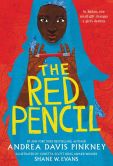 Author Andrea Davis Pinkney shares the horrors of the civil war in Darfur in THE RED PENCIL. She traveled to Africa to research and interview refugees who have survived the brutal war and those who volunteer in refugee camps to provide humanitarian support. The story of Amira is a combination of the stories Pinkney heard during her travels.
Author Andrea Davis Pinkney shares the horrors of the civil war in Darfur in THE RED PENCIL. She traveled to Africa to research and interview refugees who have survived the brutal war and those who volunteer in refugee camps to provide humanitarian support. The story of Amira is a combination of the stories Pinkney heard during her travels.Amira is excited to be turning twelve. She will now be able to wear a toob, a long piece of fabric Sudanese women wear wrapped around the head and body. Wearing a toob signifies that Amira is approaching womanhood, and she will wear it with pride.
Life in her small village is good. She has a loving father, mother, and a tiny little sister. Her sister was born with crippling birth defects, but with determination and grit, the little girl has strengthened her twisted body so she is able to walk and even play with the other village children. Amira is proud of her family.
Her only regret is that she is unable to attend school. Her best friend moved from the village to attend the Gad Primary School where she will learn to read and write. Amira's mother believes education for a girl is foolish. She says Amira should be learning to care for a family not filling her head with nonsense.
When the Janjaweed attach Amira's village, her father is killed. She and her mother and sister, along with any other survivors, are taken to Kalma where they live in crude tents and wait in long lines for small rations of water and food. Mourning the loss of her beloved father, Amira struggles to find any hope in the terrible conditions. The arrival of aid workers bringing meager supplies provides Amira with a gift that brightens her days. She is given a red pencil and a precious yellow tablet. With the help of Old Anwar, she begins to learn to read and write and express herself through drawings.
Pinkney hopes that reading THE RED PENCIL will help young people understand the tragedy still unfolding in the Sudan and Darfur. What we take for granted and often dismiss as trivial and annoying, the children of Darfur see as gifts that could change their lives forever.



No comments:
Post a Comment